The Queen of Modern Georgian Cuisine - Tekuna Gachechiladze cooks in Armenia
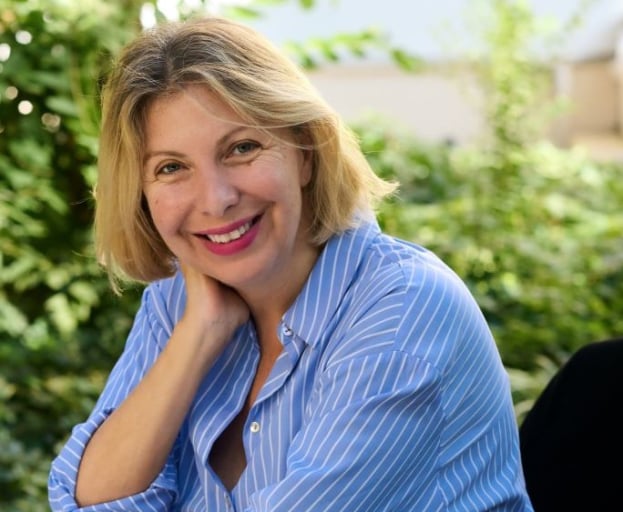
Once, in Tbilisi, I attended an event so charming and dazzling that even now, I remember it vividly - white lilies in period vases, sparkling chandeliers, and a grand staircase, the allure of dresses, and the public, sophisticated in their style and manners… And above all, I recall the majestic atmosphere that permeated the lavishly decorated halls of the Art Nouveau mansion. On that day, in this grand house, once the home of the Sarajishvili family and where Emperor Nicholas the Second was hosted in 1914, Paris-based Georgian designer Djaba Diassamidze presented his latest collection of Haute Couture…
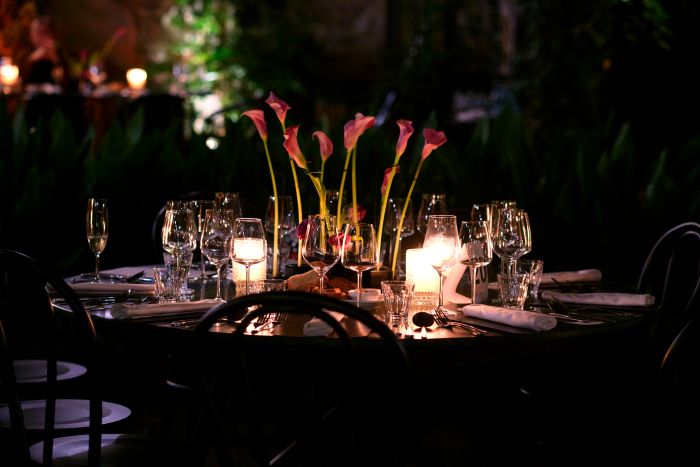
Café Littera
You might wonder - why do I share this story? Because then, I stepped into the open area of that mansion only to find myself in the whimsical world of Café Littera, nestled among the trees and vegetation of a garden that has been the center of cultural life in Tbilisi and its beau monde for more than a century. Oh, that ambiance! That music, that lighting, those table settings... That place surely had a spirit!
Today, almost five years later I have returned to meet its owner - Tekuna Gachechiladze, who will soon, on April 12th and 13th, come to Armenia to present exclusive dinners at Tsaghkunk Restaurant & Glkhatun as part of a collaborative initiative between the restaurant and Bon Vivant Communications which in 2021 brought Michelin star chef Mads Refslund to Armenia.
I enter the garden… The table for our lunch is already set. A ginger cat guards it with royal demeanor... And there she is, with the warmest smile - Tekuna Gachechiladze! Everyone calls her the Queen of Modern Georgian Cuisine. In just a minute or two, I will discover why, and get acquainted with the person behind this grand title.
Tekuna, - I begin, - you were studying psychology in Germany, but then you went to New York to become a chef - what made you do so?"
Love, - Tekuna smiles.
Really? For someone or something?
Both. I've always loved entertaining. Even during the difficult 1990s, we were hosting dinner parties at home. I think hospitality is in my blood - hosting people, making them feel good and happy. I wasn’t so much into cooking back then; entertaining was my thing. But later, while studying in Germany, I was working in restaurants - front of the house, back of the house, catering... It was a way to earn money, but with five years of experience, you grow... I went to New York to do my PhD, and yet again, I began working at restaurants. And then I fell in love with a chef..."
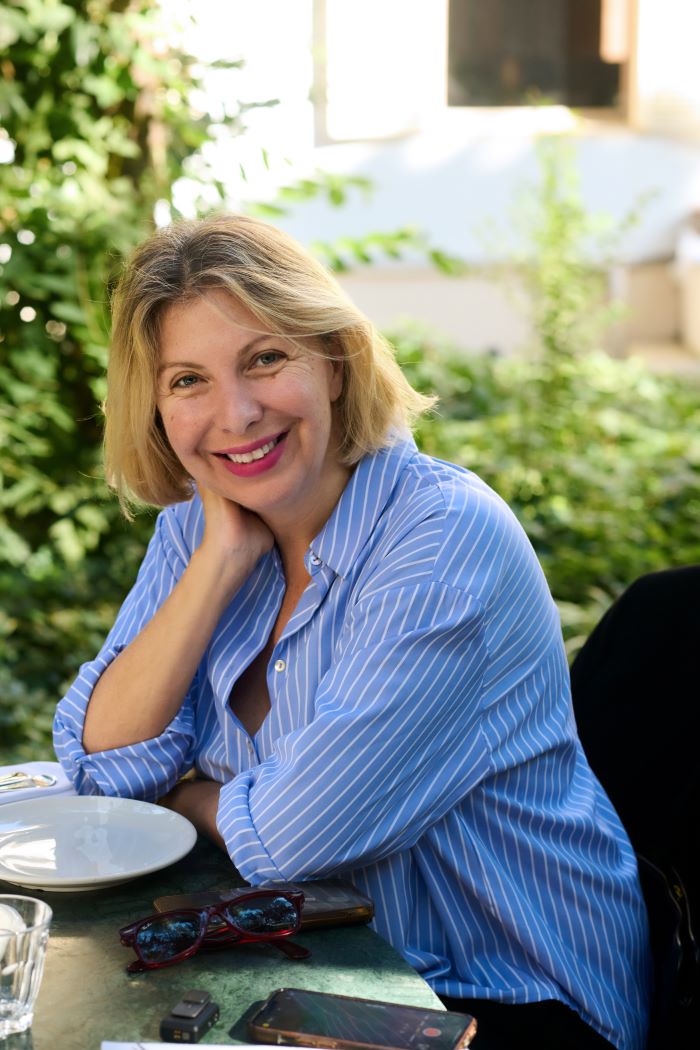
Tekuna Gachechiladze in her Café Littera
And then a story begins... Was it a turning point?
Yes! He said to me, 'You cook much better than you analyze,' Tekuna laughs. 'Forget your Ph.D. in psychology, - he said, - and better study culinary arts.' And I listened to him! You know, for me, cooking is a shortcut to happiness – you make people happy straight away. He was right in saying that in psychology, you will never achieve this because it’s a very long process, and then, when you finally make someone happy, they leave you. But in cooking, they will always come back to you when happy. Good approach," I thought, "and began my study at the culinary academy of New York.
Is it true that your father didn’t talk to you after you told him about your decision to become a chef?
Yes. Well, he wanted a doctor daughter, and instead here I am telling him that I have decided to be a chef! For him, a chef was something unimaginable. It was around 2004. We didn’t have a restaurant culture, and the idea of his daughter being a chef... He was from an older generation, you see."
Isn’t it amazing how the perception of the profession has changed in a considerably short time? Chefs are stars now! It's inspiring that you listened to your heart. Have you since reconciled with your father?"
Oh, yes. He accepted it gradually.
So, you could have stayed in New York, but something made you come back – what was it?
In 2006, friends of mine decided to open a French bistro in Tbilisi, and I came back to make it happen. Not that I had much idea about it all, but when you are in New York… This city gives you a feeling of self-confidence, you believe that you can do everything. So, I said, 'Okay, I can do French! Why not?' Tekuna laughs. -We did it, and it turned out to be very successful. Then we opened the second restaurant, and the third one, and then I decided to stay in Georgia, realizing that I can do much more for my country being here than in New York, even if working in the great restaurants there.
People persistently call you the Queen of Georgian Modern Cuisine and Fusion. Tell me about your 'fusion journey'.
I was not really thinking about traditional cuisine when I came back. In New York, I worked at Buddakan (a restaurant featuring fusion between Asia and 16th-century Paris), and everything I learned there, I wanted to bring to Georgia. It was so novel, so many new ingredients… You want to offer everything to people, thinking that they deserve to have all that we had in NY. So, the second restaurant that we opened was Asian. It was only after that I started to think: 'Okay, it’s all very good, but what about diversity in our Georgian cuisine?' In the 2000s, there was no such variety in traditional menus whatsoever: the same 25-30 dishes, although very nice, but all the same everywhere. Same dishes, same plating, same menu writing, and nothing extraordinary. Maybe it was the same story in Armenia? So, I thought, if I cook Georgian (and I love cooking Georgian!), I want to do something of my own, to have a different touch. I started to make very, very small changes. I don’t even know why they are calling me revolutionary. Ferran Adria is revolutionary, - Tekuna laughs. - I cooked traditional recipes with new ingredients – for example, mussels chakapuli, or shrimp kharcho. Why did I do that? Not because I thought that original kharcho was bad and needed to be elevated or changed, but because I wanted to give people a choice! Isn’t that the best for people? To always have a choice - one day they can eat traditional, another day something innovative."
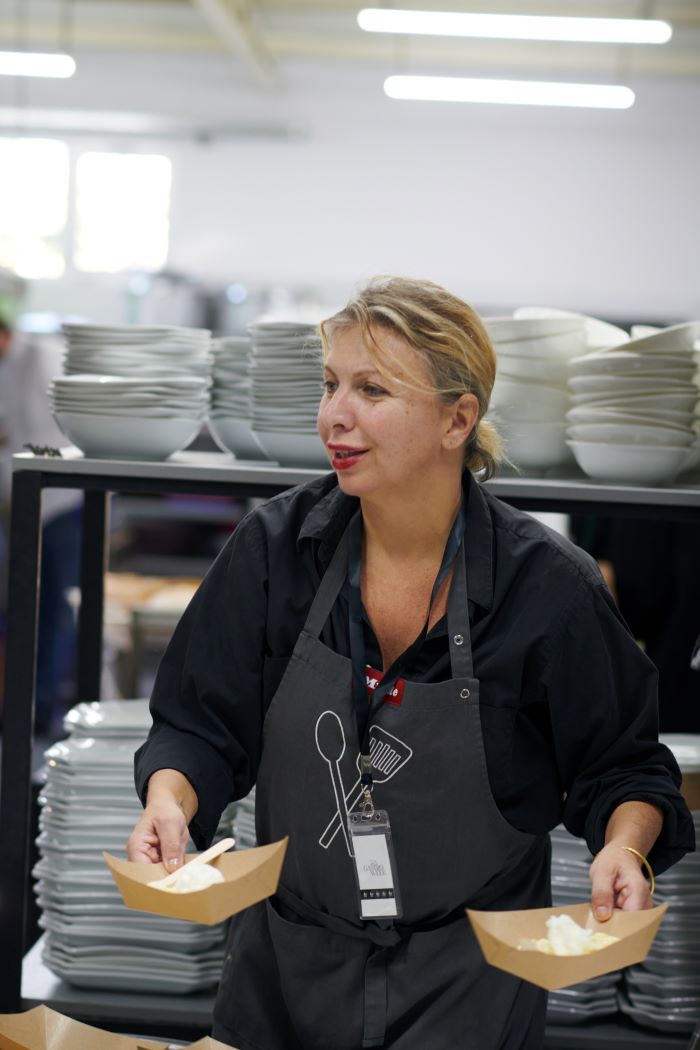
Backstage of Tbilisi Gastro Week
I can see how mussels chakapuli could cause a storm of indignation. I can almost hear people saying ‘how could she?’… Sometimes it’s hard to explain why national cuisine needs interpretation.
Oh yes, there were people who said that I was destroying tradition and that our food was so good that there was no need to upgrade it or make any changes. I did it not because I thought that it was not good enough. No, that’s a very wrong perspective. I did it because I truly believed that if we don’t upgrade traditional food, it will start to disappear. Think of that - we don’t live the way we lived before; we don’t have the same habits that we had centuries ago. The food must adapt with the time to suit our lifestyles, our mentality, rhythm and changes. And the presentation – isn’t it always your fantasy? So, why should you always do what someone has already done? You can be even more creative - give it your touch, demonstrate what the cuisine means for you and how this or that dish can look in your interpretation. That's where I was coming from when I started my very, very small changes."
It reminded me of Vakhtang the Sixth – the monarch of yours. Apart from many impressive deeds, he boosted changes in the nation’s food stock, encouraging farmers to grow eggplants, tomatoes and other novel ingredients. No doubt there was a wall of resistance and a storm of disapproval of his ideas but look now – 300 years later and who can imagine Georgian cuisine without eggplants and tomatoes? I love this story because it so brilliantly illustrates that the cuisine is a living creature; it is like language - constantly changing, embracing, transforming… So let me praise your determination: what you call 'my very-very small changes' indeed brought big ones.
Thank you. I am a Taurus, I am stubborn, - laughs Tekuna. If I decide to do something, I do it. You know, if you believe in something, even if it’s only you, it gives you strength. And if there are 3-4 people who believe in you, it gives you courage. It was not easy from the beginning, to be honest. Like I had this idea that if I open my school and start to educate people, they won’t be so harsh on me. So, I opened Culinarium but people were not coming. Then I started to do chef’s tables and every weekend I did degustation menus. Expats started to come, then foreigners, and then – then the Georgians began to appear. A turning point was when Anthony Bourdain made his episode on Tbilisi for his 'Parts Unknown.' He filmed in my restaurant and after that every American tourist coming to Georgia wanted to come to my place and eat what he was eating."
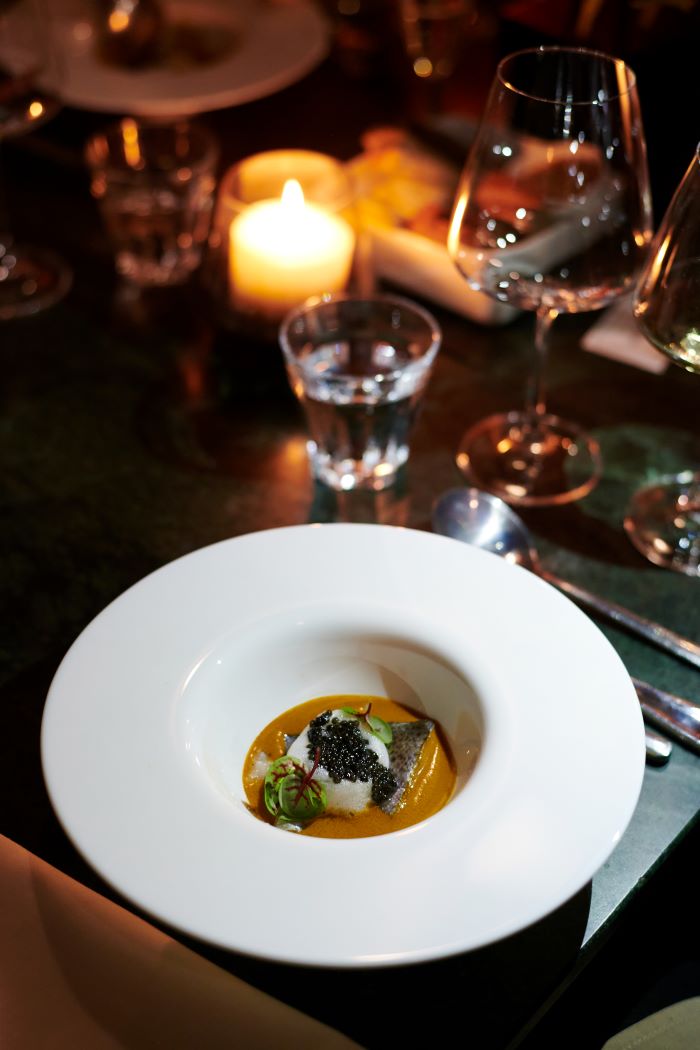
Collborative dinner of Tekuna Gachechiladze and Michelin chef Deepanker Khosla
That’s television for you! As I recall, it was mussel chakapuli, right, that you gave him?
Yes, you are right, it was! After that, I decided to have my own TV program – “Tekuna’s Culinarium”. I was so annoyed that my cooking school didn’t work that I thought that I should go on national TV and teach people cooking, - laughs Tekuna. - But really, I did it because I wanted to convey a message. If you wish, you can eat the same stuff every day, but what if you change something? Let's say we have this famous dish, chakhokhbili - chicken in tomato sauce. Add a bit of curry paste and a little bit of coconut milk, and you have a chicken curry. Add olives and herbes de Provence, and you have chicken Provençal. The same three ingredients – onions, tomatoes, and chicken – and you can make 5-6 different dishes. I tell you; women had a big relief. Everything I was cooking in my restaurant, I was cooking on TV. It became very popular and ran for 4 years. Slowly, people started to appreciate my ideas because when you cook something at home, it doesn’t look so scary anymore. You try, experience, and you realize - well, actually it’s not a bad idea. When you have success and see your menu in many restaurants and feel that people have taken inspiration from what you do – you start to think that you are doing something right. Tbilisi has become so diverse now. We have so many young, talented chefs who don’t have to walk the difficult path I did, when at the beginning people could even insult me. We – me, Meriko Gubeladze, Keti Bakradze – we started this movement and cleared the way for the next generation. Now, almost all restaurants you go to, except the very traditional ones, offer many different versions of traditional dishes - that's what makes cuisine diverse. Some of them will survive, some not, but we now have what’s called contemporary Georgian cuisine, and its roots are in traditions.
You recently visited Armenia. Can you share your general impressions? Did you enjoy anything in particular in Armenian cuisine?
Meat! You are the masters of meat. Georgians will kill me for this, but I have to say, the shashlik I had in Yerevan was the best I've ever eaten, really. And we had this kebab night, and again - it was the best kebab I've ever had. Is it the quality of the meat, or the type of charcoal you use, or the way you control the fire? It was very good indeed. I think the level of culinary skill in Armenia is very high.
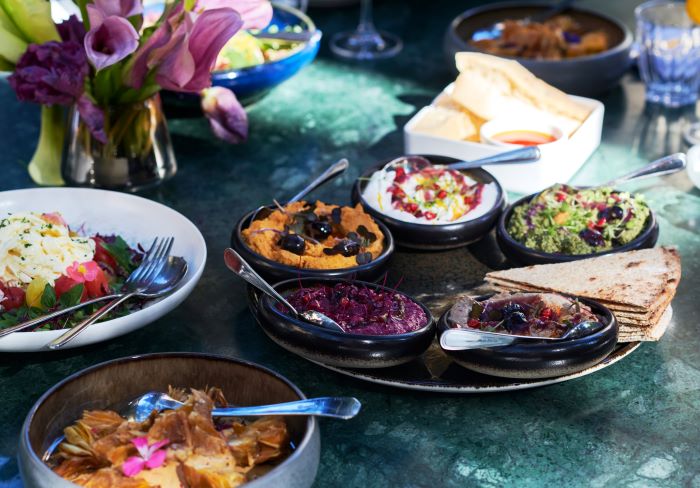
Lunch at Cafe Littera
It's almost striking that we, as neighbors, don't have many collaborations in the culinary domain. Is this the reason you came to Armenia – to change this paradigm?
Absolutely! People are even coming to us from Brazil to cook together, and yet we – being neighbors and sharing so many similarities and bonds – don't have any collaborations. So, yes, I am coming to Armenia to cook 4Hands dinners at the Tsaghkunk Restaurant & Glkhatun with its chef Arevik Martirosyan very soon – on April 12 and 13. And later, she will come to Tbilisi to cook with me at one of my restaurants - Café Littera.
I toast to that – Viva great culinary adventures!
Yes, I think we’ll take our similarities, apply our creativity, and see where it takes us – I believe that it will be very interesting!
Tekuna, based on your vast experience, do share - what makes a restaurant great?
I think that 49% is service and how you train your staff, it's about the atmosphere - the lighting, the plating, and of course, good food. And 51% - is hospitality. People come to your restaurant and they are happy, they don’t want to leave. That’s the secret. Even if something goes wrong, you can still make them happy. I always try to hire people who have a natural talent for hospitality because it’s very hard to learn it. Guests are very sensitive; they will return if they feel comfortable and happy, even if it wasn't the greatest menu of their life. In the restaurant business, keeping people coming back is so important, and people don’t go to restaurants only for food but for the moments of happiness. And that depends on every detail. It's like a stage where everything acts in harmony.
Do you often engage with your guests?
Yes, especially in summer. Every month, we give out about 50 liters of chacha and wine as compliments to our guests. You know, we have a country house and a farm where I grow vegetables because I'm really against importing and am a strong advocate of local and seasonal produce. So, besides the farm, we have a winery where my husband makes the wine. He said to me: 'Tekuna, do whatever you like, but please, leave the wine to me. Don't mess with my wine'- laughs Tekuna.
I have to ask this: you have five restaurants, you travel a lot, like recently, I noticed you were at The Best Chefs Award in Mexico, you do exciting collaborations, host gorgeous dinners (by the way, I admire the way you decorate your tables), and you always seem so vibrant and energetic. Tell me, what is your life force?
I think the most important thing is that you do something you really like and that you are satisfied with yourself. That gives energy and happiness. And happy people are positive, agree?
Totally. I was lucky to see and photograph you backstage during the International Tbilisi Gastro Week. Backstage of such massive events can be stressful, but I always saw you in a great mood, smiling and joking. So, I anticipate being at your dinners at Tsaghkunk Restaurant & Glkhatun, and I might even slip backstage to photograph the masters at work and say to you personally: Tekuna Gachechiladze, Welcome to Armenia!
Nata Brettell
Follow NEWS.am STYLE on Facebook, Twitter and Instagram
- Sylvester Stallone's watches, including ‘Holy Grail’ of his collection, to be auctioned And on June 5, the Hollywood star is putting up 11 watches from his personal collection for auction at Sotheby's in New York...
- New York's Times Square tops list of world’s worst tourist traps By the end of 2024, 64.5 million tourists are expected to visit New York City—just a couple of million short of the record 66.6 million in 2019, with almost all of them guaranteed to at least stroll through Times Square. And according to a new poll, they'll hate it...
- Eurovision 2024: Alexander Rybak says Armenian song Jako is one of his favorites The winner of Eurovision 2009, Alexander Rybak, who won the Contest representing Norway with the song "Fairytale", says Armenian song Jako is one of his favorites among this year's songs...
- Eurovision 2024: How to vote for Armenia? Armenia's representatives in Eurovision 2024, the members of Ladaniva, will perform their song "Jako" in the second semi-final of the Contest, which will take place on May 9...
- ‘Wednesday’ 2nd season shooting kicks off Filming has begun for the second season of Wednesday. When the series first debuted on Netflix, it broke records. With 252 million views, it quickly became the most popular English-language series and spent 20 weeks in the global top ten...
-
21:11, May 8
World’s ex-richest man, Warren Buffett: Success isn't about money, it's about being loved by those you want to love -
20:26, May 8
Sylvester Stallone's watches, including ‘Holy Grail’ of his collection, to be auctioned -
19:27, May 8
New York's Times Square tops list of world’s worst tourist traps -
16:32, May 8
Horror movie to be made about Jesus’ childhood -
15:11, May 8
Khloe Kardashian speaks about problems she faced after birth of her son, Tatum -
15:00, May 8
Eurovision 2024: Alexander Rybak says Armenian song Jako is one of his favorites -
14:18, May 8
Anna Wintour bans 3 foods from Met Gala -
13:21, May 8
Eurovision 2024: How to vote for Armenia? -
13:17, May 8
‘Wednesday’ 2nd season shooting kicks off -
12:34, May 8
Jessica Biel takes bath with 9kg of salt before Met Gala -
11:23, May 8
Kim Kardashian reveals secrets behind her sensational Met Gala look -
10:46, May 8
Shakira wears bold satin white dress to Met Gala after-party
All materials
- Archive























